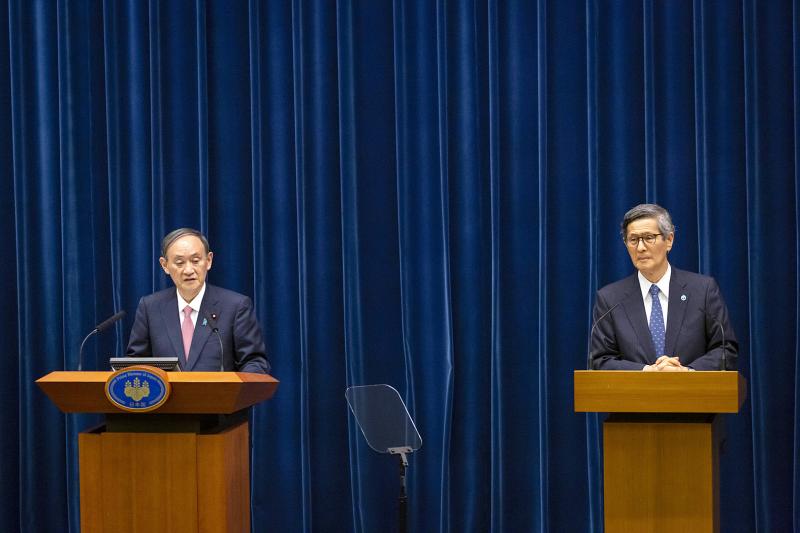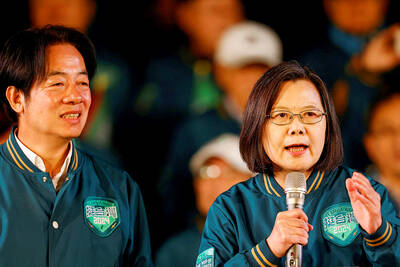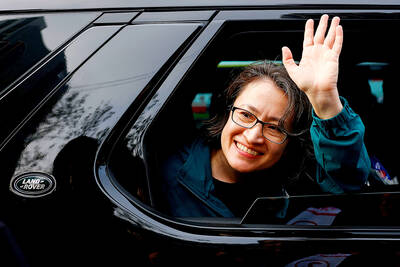While Shigeru Omi may invite comparisons to Anthony Fauci, Japan’s top COVID-19 adviser has shown little of his American counterpart’s flair for challenging politicians. That is, until he started suggesting banning spectators from the Tokyo Olympics.
Omi, the government’s top adviser on COVID-19, is a mild-mannered 72-year-old public health expert often seen by Prime Minister Yoshihide Suga’s side. But his concern over the health risks seems to have prompted him to question the government’s plans to allow domestic fans at the Olympics.
Omi appeared to open a gap with Suga, who has pressed ahead with holding the Olympics as planned, when he told a parliamentary committee on June 2 that “it’s not normal” to be staging the global sports spectacle in the middle of a pandemic. The organizers needed to make a stronger case for holding the event in order to gain people’s necessary cooperation, he said.

Photo: EPA-EFE
“Why on earth are we doing this in the current circumstances?” Omi said. “The purpose hasn’t quite been made clear.”
Such public questioning of the official position is unusual in Japan’s hierarchical political culture and has boosted his already considerable public profile. Like Fauci when Donald Trump was US president, Omi’s views have given voice to a segment of the Japanese public dismayed with the government’s direction. While the tenor is far lower than the fever pitch of American politics, Omi’s remarks have also invited a swift backlash, just as Fauci is now a lightning rod figure in the prolonged debate over virus policy and health measures in the US.
Former Internal Affairs Minister Heizo Takenaka told a TV talk show that Omi had exceeded his authority with the remarks. Now Omi and other experts are set to release a proposal on the Olympics, which Health Minister Norihisa Tamura has already indicated he won’t be treating as official advice.
Omi told reporters Wednesday the general outline of his report had been decided, declining to elaborate before its release. Public broadcaster NHK said the report says holding the games without fans would be the least risky option. The news made for its most-shared story on its Web site yesterday morning.
“Japan doesn’t have a system where members of the establishment air their own independent views,” said Tsuneo Watanabe, a senior research fellow at the Sasakawa Peace Foundation in Tokyo. “It doesn’t go as far as North Korea or China, but everyone’s very cautious. The government doesn’t choose people who will express different opinions.”
OLYMPIC QUESTIONS
Omi has said the greatest danger lay not within the athletes’ bubble, but among the fans who would travel to Tokyo, creating more opportunities for the virus to spread. Organizers announced in March that overseas spectators wouldn’t be allowed.
The government is backing a 10,000-person limit on public events, which could be applied to the Olympics. A decision on spectators was expected later this month, government spokesman Katsunobu Kato said Wednesday.
Domestic media have reported that some spectators are likely to be allowed at venues, although the decision may not be made public until after the state of emergency in Tokyo ends.
Organizers for the Tokyo Olympics and Paralympics plan to halt selling any more tickets to the events, Kyodo News reported Thursday, citing an unnamed official with knowledge of the move.
In a survey by public broadcaster NHK published this week, 29 percent of respondents said the Olympics should be held without spectators and 31 percent said it should be canceled. About 32 percent said it should be held with limited numbers of spectators.
Suga has repeatedly said the Olympics can be held safely, despite waves of virus infections and a vaccine rollout that lags other wealthy nations. He faces a party leadership vote in September and if there are major problems with the Olympics under his watch, he could join a long list of short-serving Japanese prime ministers.
At the Group of Seven leaders meeting in Cornwall, UK over the weekend, Suga’s debut at a multilateral in-person summit, the premier won the support of US President Joe Biden and other leaders for the Olympics.
A rift with the administration is an unfamiliar situation for Omi, previously more likely to be criticized for tailoring his opinions to suit the government. In an article on his alma mater’s Web site he says he never felt like taking part in the left-wing student demonstrations raging in Tokyo when he entered the elite Keio University in the 1960s.
Dropping out of a law course in favor of a medical degree at the then newly formed Jichi Medical University, Omi went on to earn a doctorate on the Hepatitis B virus, and eventually landed the job of WHO director for the Western Pacific. A fluent English-speaker, he was so plugged into the political system that he was in 2006 nominated by the Japanese government to be WHO director-general.
The pandemic may be prompting him to set aside his diplomatic skills.
“If they hold it, I want the Olympic and Paralympic Organizing Committee to reduce it in scale as far as possible, and strengthen the management system as much as they can,” Omi told lawmakers on June 2.

The year was 1991. A Toyota Land Cruiser set out on a 67km journey up the Junda Forest Road (郡大林道) toward an old loggers’ camp, at which point the hikers inside would get out and begin their ascent of Jade Mountain (玉山). Little did they know, they would be the last group of hikers to ever enjoy this shortcut into the mountains. An approaching typhoon soon wiped out the road behind them, trapping the vehicle on the mountain and forever changing the approach to Jade Mountain. THE CONTEMPORARY ROUTE Nowadays, the approach to Jade Mountain from the north side takes an

Last week Joseph Nye, the well-known China scholar, wrote on the Australian Strategic Policy Institute’s website about how war over Taiwan might be averted. He noted that years ago he was on a team that met with then-president Chen Shui-bian (陳水扁), “whose previous ‘unofficial’ visit to the US had caused a crisis in which China fired missiles into the sea and the US deployed carriers off the coast of Taiwan.” Yes, that’s right, mighty Chen caused that crisis all by himself. Neither the US nor the People’s Republic of China (PRC) exercised any agency. Nye then nostalgically invoked the comical specter

Relations between Taiwan and the Czech Republic have flourished in recent years. However, not everyone is pleased about the growing friendship between the two countries. Last month, an incident involving a Chinese diplomat tailing the car of vice president-elect Hsiao Bi-khim (蕭美琴) in Prague, drew public attention to the People’s Republic of China’s (PRC) operations to undermine Taiwan overseas. The trip was not Hsiao’s first visit to the Central European country. It was meant to be low-key, a chance to meet with local academics and politicians, until her police escort noticed a car was tailing her through the Czech capital. The

April 15 to April 21 Yang Kui (楊逵) was horrified as he drove past trucks, oxcarts and trolleys loaded with coffins on his way to Tuntzechiao (屯子腳), which he heard had been completely destroyed. The friend he came to check on was safe, but most residents were suffering in the town hit the hardest by the 7.1-magnitude Hsinchu-Taichung Earthquake on April 21, 1935. It remains the deadliest in Taiwan’s recorded history, claiming around 3,300 lives and injuring nearly 12,000. The disaster completely flattened roughly 18,000 houses and damaged countless more. The social activist and